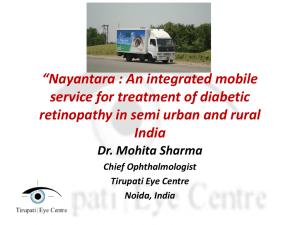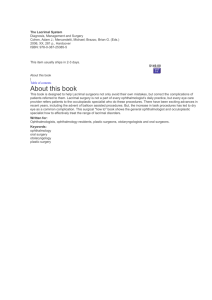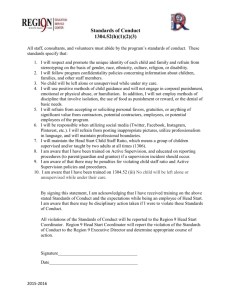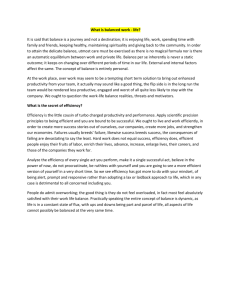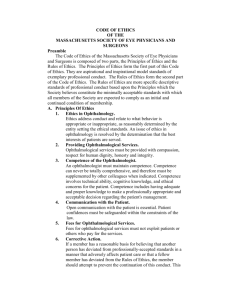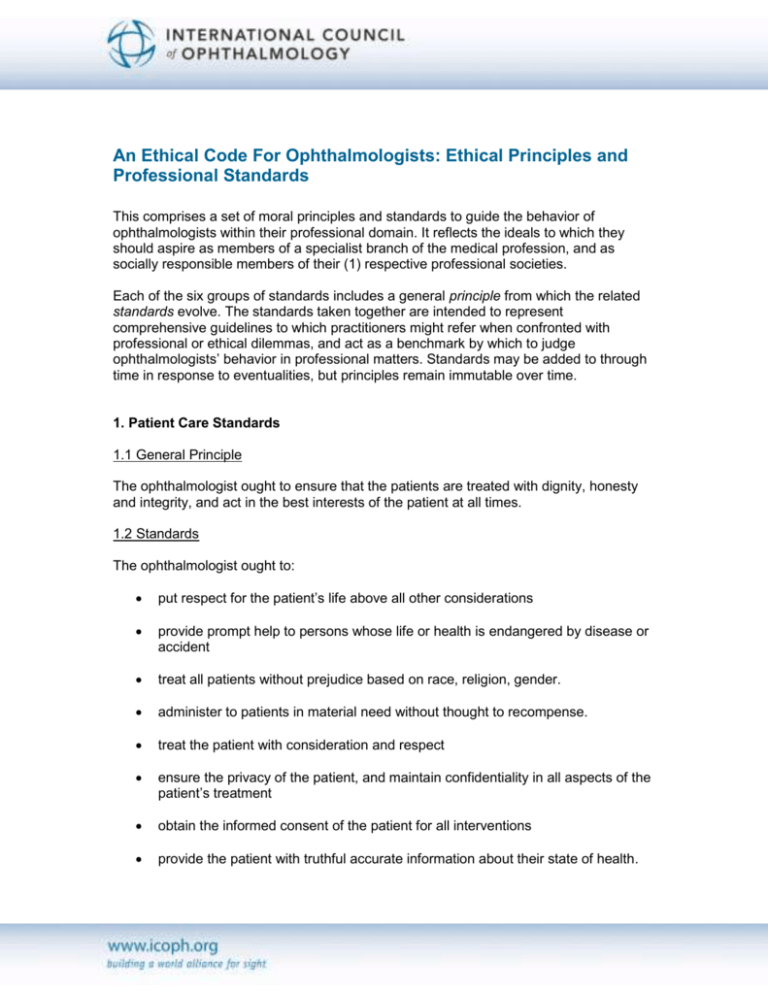
An Ethical Code For Ophthalmologists: Ethical Principles and
Professional Standards
This comprises a set of moral principles and standards to guide the behavior of
ophthalmologists within their professional domain. It reflects the ideals to which they
should aspire as members of a specialist branch of the medical profession, and as
socially responsible members of their (1) respective professional societies.
Each of the six groups of standards includes a general principle from which the related
standards evolve. The standards taken together are intended to represent
comprehensive guidelines to which practitioners might refer when confronted with
professional or ethical dilemmas, and act as a benchmark by which to judge
ophthalmologists’ behavior in professional matters. Standards may be added to through
time in response to eventualities, but principles remain immutable over time.
1. Patient Care Standards
1.1 General Principle
The ophthalmologist ought to ensure that the patients are treated with dignity, honesty
and integrity, and act in the best interests of the patient at all times.
1.2 Standards
The ophthalmologist ought to:
put respect for the patient’s life above all other considerations
provide prompt help to persons whose life or health is endangered by disease or
accident
treat all patients without prejudice based on race, religion, gender.
administer to patients in material need without thought to recompense.
treat the patient with consideration and respect
ensure the privacy of the patient, and maintain confidentiality in all aspects of the
patient’s treatment
obtain the informed consent of the patient for all interventions
provide the patient with truthful accurate information about their state of health.
1.2.1 Advertisement in Ophthalmology
Doctors can announce their service to their actual and potential patients as well as their
own colleagues. Advertisement:
can aim announcement for information purposes, should not aim marketing
should not include self laudatory
should not include critics of other techniques, machines nor and colleagues.
2. Professional Practice Standards
2.1 General Principle
The ophthalmologist ought to ensure that ophthalmic care is of the highest quality
possible.
2.2 Standards
The ophthalmologist ought to:
perform only those procedures in which he/she is competent by reason of
specific training or experience, or is assisted by one who is
maintain competence in technical ability, cognitive knowledge, and
professionalism, keeping abreast of developments in ophthalmic practice
refrain from misrepresentation of credentials, training, experience or ability
find the best quality care for the patient’s condition, including appropriate
referrals as required by the condition
maintain accurate records of relevant information about the patient and their
state of health
be appropriately dressed to meet the requirements for hygiene and courtesy
respect laws and ethical guidelines on the use of donated human tissue
respect local variations in medical practice and customs, provided these do not
contravene the ethical standards
refrain from or withdraw from engaging in any form of clinical practice that might
be compromised by the physician’s mental, emotional or physical impairment
take corrective action when aware that an impaired ophthalmologist has not
ceased inappropriate behavior, including notifying the appropriate authorities.
3. Professional Community Standards
3.1 General Principle
The ophthalmologist ought to be a responsible member of their professional community
by maintaining standards, avoiding conduct that would bring the community and its
members into disrepute.
3.2 Standards
The ophthalmologist ought to:
• treat colleagues with respect
• maintain respectful professional dialogue, conducted in a manner that advances the
best interests of the patient, including the sharing of relevant information
• provide help to colleagues in cases where professional standards of care are below
available possibilities
• respect the interests of the referring physician when asked for consultation or second
opinion
• refrain from acting as an expert witness in legal cases unless one can do so truthfully.
4. Research Standards
4.1 General Principle
Ophthalmologists should be conscious of and observe the ethical, legal and scientific
criteria for medical research.
4.2 Standards
The ophthalmologist ought to:
• observe appropriate review mechanisms for clinical research
• inform research subjects of the nature of the investigation, and obtain special informed
consent
• refrain from representing another’s work as their own
• report research accurately and avoid conflict of interest.
5. Social Standards
5.1 General Principle
The ophthalmologist ought to ensure that communications to the public reflect their
social responsibilities, and reflect the highest level of probity.
5.2 Standards
The ophthalmologist ought to:
• communicate accurately with the public
• refrain from misrepresentation of credentials, training, experience or ability
• refrain from providing false, deceptive, or misleading information
• refrain from misleading through omission of material information
• refrain from appealing to an individual’s anxiety in an unfair way for self-benefit.
6. Commercial Standards
6.1 General Principle
The ophthalmologist ought to ensure that fees for ophthalmologic services do not exploit
patients or others who pay for the services, that economic and non-economic conflicts of
interest do not interfere with the delivery of the highest quality care, and that the
advertising of services reflects information and not commercial criteria.
6.2 Standards
The physician should:
• recommend only those tests, devices, drugs or procedures that advance the best
interest of the patient
• not withhold necessary care to a patient’s detriment and for the physicians financial
advantage
• refrain from prescribing unnecessary tests, devices, drugs or procedures
• disclose fees without misrepresentation, including future costs to be incurred as part of
treatment
• refrain from misrepresenting services, or the charges made for services
• provide clear and sufficient information about the availability and type of services
offered, without competing on a commercial basis.
Developed by the International Council of Ophthalmology Ethics Committee:
Pinar Aydin, MD, PhD, Turkey, Chair
Pran Nagpal, MD, India
Antonio Secchi, MD, Italy
Consultants to the Committee:
Charles Zacks, MD
Albert Jonsen, PhD
Approved, Advisory Committee to the ICO, February 18, 2006
Approved, International Council of Ophthalmology, February 19, 2006
Copyright © 2006 International Council of Ophthalmology. All rights reserved.
945 Green Street, San Francisco, California, USA 94133
Fax: (+1) 415 409-8403 E-mail: info@icoph.org Web: www.icoph.org

